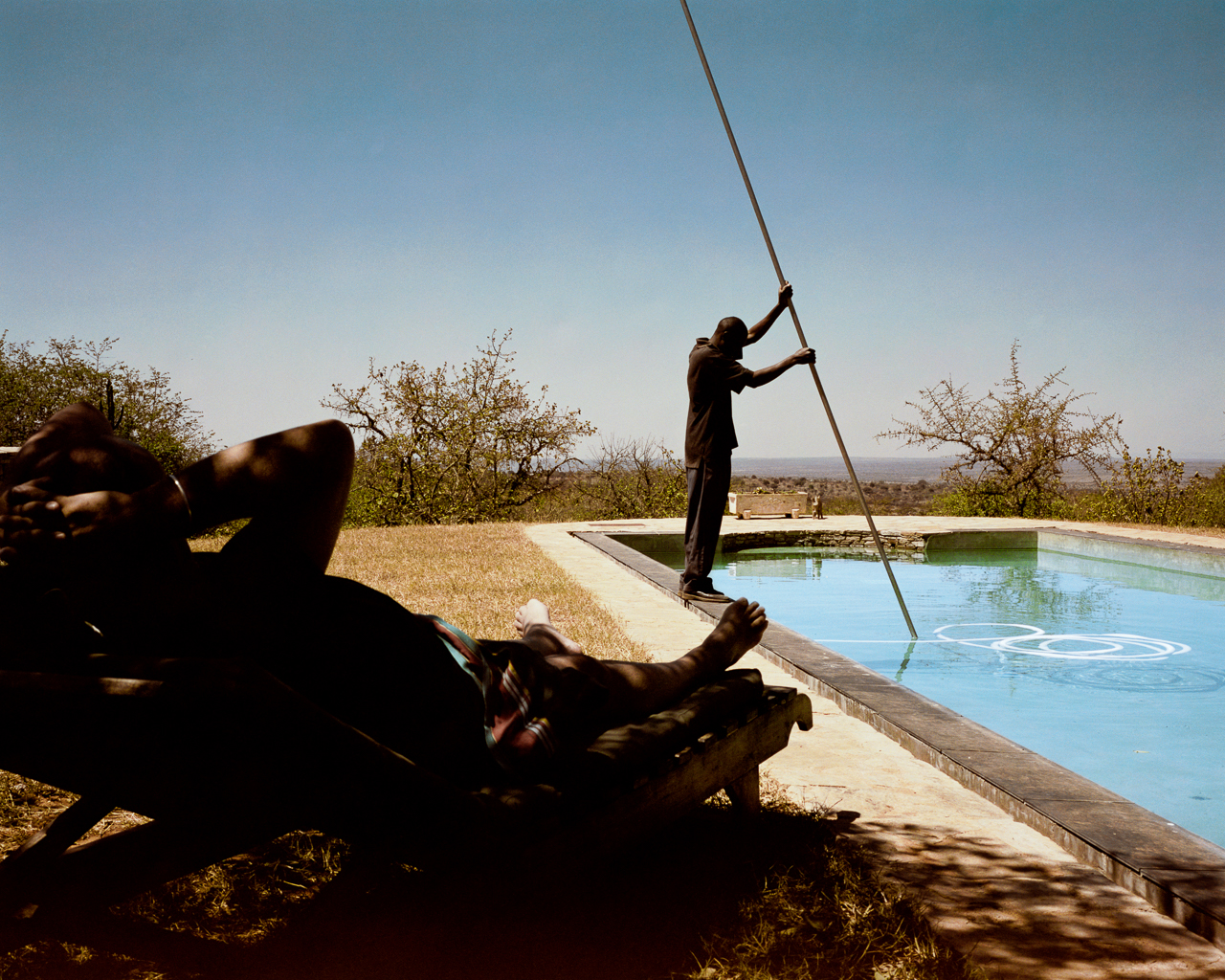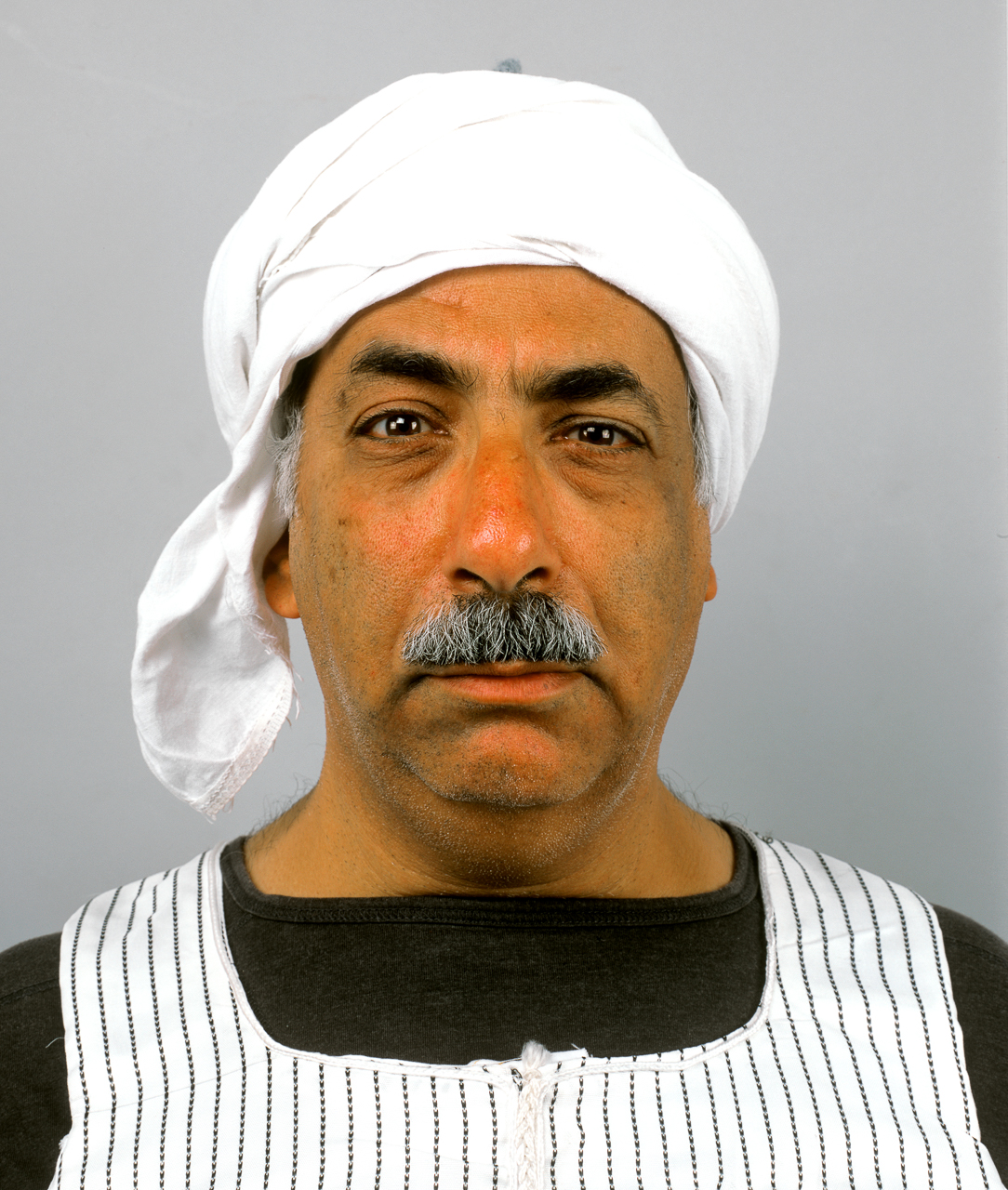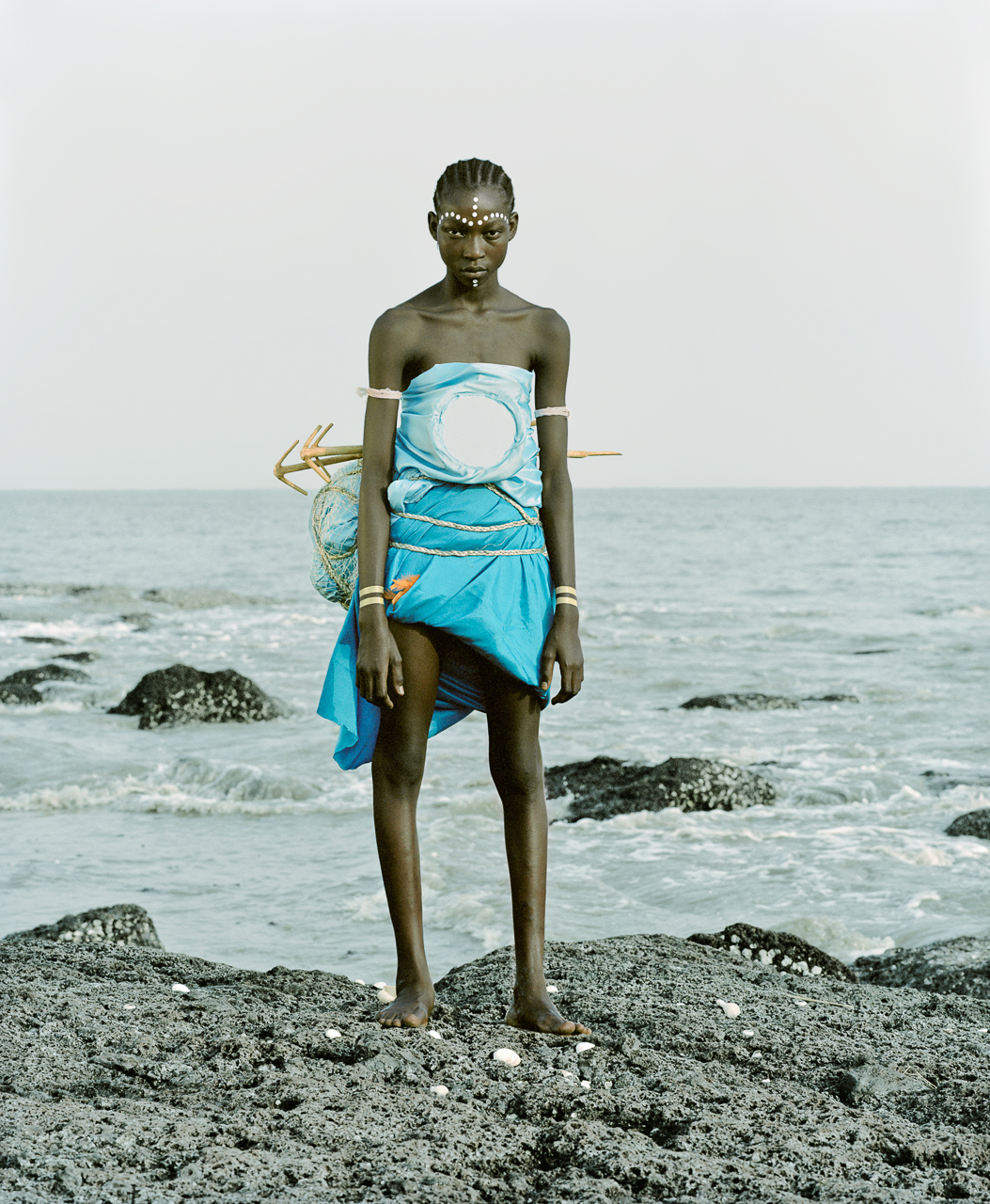POPCAP 2012
POCPAP was first awarded in 2012. In the centre of Basel during Art 43 we celebrated the completion of the first edition of POPCAP (the piclet.org Prize for Contemporary African Photography) by screening the five winning portfolios. These screenings reached around 1000 people daily and due to positive feedback we extended the show from five to eight days.
View of the exhibition in June 2012, Basel, Switzerland
The POPCAP 2012 winners
Guillaume Bonn
Born in 1970 in Antananarivo, Madagascar. Lives in Paris, France
www.guillaumebonn.com | Instagram: @guillaumebonn
Silent Lives
A selection of images from Silent Lives is available for sale at Edition POPCAP.
Silent Lives was inspired by Juliette, a Madagascan matriarch who worked for my grandfather for 50 years. When he died, she decided to leave us with neither farewell nor retirement package. The family were stricken by her abrupt departure but were never able to trace her whereabouts. Juliette’s actions said she needed neither us nor our money. My grandfather had assumed that he was in charge but perhaps the true power lay with Juliette after all. So in fact the power relationship between employer and employed is shifting and subtle. What Juliette had demonstrated still tends to hold true today. Employers know very little about their servants’ lives, their families, their dreams and hopes. Their servants have no authority but carry a large burden of responsibility. These people who are banished to small rooms at the bottom of the garden when night has fallen are, during the day, stewards of power. The nannies nurture their employers’ children and help to shape their perception of the world. The chauffeurs take the children to school and back driving in a way that will keep them out of harm’s way from not only car accidents but carjackers and kidnappers. The night watchmen guard the property at night with only a club or perhaps a bow and arrows. It is not uncommon to read that a night watchman has been shot dead by gun-bearing thugs. All these people see much and say little. And they never betray the trust that has been bestowed on them. When their charges grow up and become employers themselves, will they remember who looked after them? Silent Lives is my way of honoring these men and women by shining a light on how they live as they uphold their side of the contract. I cannot say it is an attempt to restore their dignity, because it is very clear that they never lost it.
A selection of images from All Egyptians is available for sale at Edition POPCAP.
A person’s clothing and appearance send messages asserting his or her identity or thinking, assertions addressed to a circle of relationships. Well-mastered, appearance expresses less and less a state of fact and becomes pure communication. The question is: How far can we trust it? I have observed that in recent years a lot of people in Egypt, under cover of having a new financial or religious status, changed their look radically and relatively fast and, in the same way, changed their social relationships. What can be deduced from this? At the least, that everyone has multiple faces; at the worst, that clothes make the man. In February 2010, I started an art project, miming with my face many Egyptian male characters. I started shooting the photo series, while brushing, dyeing and shaving my hair and beard differently at different stages throughout a year. Part of the photographic series Egyptians was on view at the Darb Gallery in Cairo in December 2010, when the bomb attack against a Coptic Church in Alexandria during a New Year's Eve service killed 21 people. As a response to this attack, the founder and director of Darb 1718 and myself took the initiative to make a protest poster using the photographs, adding the slogan "All Egyptians". Ten days later the revolution started. While the sit-ins on Tahrir Square and later on, the activists displayed the poster “all Egyptians” and reproduced it on huge tarpaulins used as a symbol of unity. These images made first to question identity aspects changed their status and were looking more like communication, I thought. In reality, beyond the displayed slogan, there was enough ambiguity remaining to carry on questioning identity.
Namsa Leuba
Born in 1982 in St-Aubin, Switzerland. Lives in Neuchâtel, Switzerland
www.namsaleuba.com | Instagram: @namsaleuba
Ya Kala Ben / Crossed look
I am an African-European, born in Switzerland and my project was accomplished on a trip to Guinea Conakry. In this work, I was interested in the construction and deconstruction of the body as well as the depiction of the invisible. I have studied ritual artifacts common to the cosmology of Guineans; statuettes that are part of a ceremonial structure. They are from another world, they are the roots of the living. Thereby, I sought to touch the untouchable. Modesty, luck, fecundity or a channel for exorcism, those statuettes hold a cultural value through what they represent or symbolise. With this work, I transform these objects, cosmological symbols of a community, who traditionally have a signification when used as part of rituals. These objects are part of a collective that they must not be separated from, or risk loosing their value. They are not the gods of this community but their prayers. They are integrated in a rigorous symbolic order, where every component has its place. They are ritual tools that I have animated by staging live models and in a way to desecrate them by giving them another meaning; an unfamiliar meaning in the Guinean context. In recontextualizing these sacred objects through the lens, I brought them in a framework meant for Western aesthetic choices and taste. This photographic eye would make them speak differently. Throughout my fieldwork, I had to deal with sometimes violent reactions from Guineans who viewed my procedures/practices as a form of sacrilege. Some were afraid and were struck with astonishment.
Adolphus Opara
Born in 1981 in Lagos, NigeriaLives in Lagos, Nigeria
www.adolphusopara.com | Instagram: @adolphopara1
Emissaries of an Iconic Religion
In my series of portraits Emissaries of an Iconic religion I attempt to offer a visual context of interpretation by hopefully creating dialogue in re-presenting an indigenous philosophical thought system that exist in most west african spaces in syncretic and hybridized forms. In Africa, belief systems provide a context for choice and definition while also functioning as a basis for solidarity and community. My main consideration was to attempt to create images that capture the subject in its natural/original setting in a timeless fashion that harks to the enduring importance and historical relevance to african society of diviners. In this attempt to create images that can be considered timeless(in style, composition, content and context), I employed devices similar to those found in victorian portraiture, gesturing to the argument that questions the fact that there ex- ist original philosophical thought systems in Africa. This work was shown at The TATE Modern London in July 2011 and it triggered in-depth discourse as relates to the topic "Contested Terrains" which was the theme of the exhibition.
Paolo Patrizi
Born in 1965 in Rome, Italy. Lives in Tokyo, Japan
www.paolopatrizi.com | Instagram: @paolopatrizi
A Disquieting Intimacy
A selection of images from A Disquieting Intimacy is available for sale at Edition POPCAP.
The phenomenon of foreign women, who line the roadsides of Italy, has become a notorious fact of Italian life. They work in sub-human conditions; they are sent out at large without any hope of regularizing their legal status and can be easily inserted in criminal circles. Most migrant women, including those who end up in the sex industry, have made a clear decision to leave home and take their chances overseas. They are headstrong and ambitious women who migrate in order to escape conflict, persecution, environmental degradation, natural disasters and other situations that affect their habitat and livelihood. One concern is that the anti-trafficking crusade is restricting international freedom of movement. What presents itself as a campaign to protect migrants from harm is actually making their efforts to flee home, to find work, to make the most of their lives in often difficult and unforgiving circumstances, that much harder. Migrants make rational choices to travel and work in the sex industry. There aren’t any romantic notions about sex work being particularly exotic. For the existence of forced migration or that, constrained by stringent border controls, many migrants are indeed pushed to take illegal routes across the world.





















![POPCAP_2012_Winner_1280px_RGB_0619. Orisa Sanpanaa [diety of measles] - Chief Bolanle.jpg](https://images.squarespace-cdn.com/content/v1/56991158ab2810a75aa5f84b/1522586177926-REZRJIF4UH0MPTQR0X9D/POPCAP_2012_Winner_1280px_RGB_0619.+Orisa+Sanpanaa+%5Bdiety+of+measles%5D+-+Chief+Bolanle.jpg)
![POPCAP_2012_Winner_1280px_RGB_0413. Orisa Lajoomi [diety of children] - Mrs. Ogunremi Lekun.jpg](https://images.squarespace-cdn.com/content/v1/56991158ab2810a75aa5f84b/1522586164307-IY3C0GLRFWAC6TX08WL3/POPCAP_2012_Winner_1280px_RGB_0413.+Orisa+Lajoomi+%5Bdiety+of+children%5D+-+Mrs.+Ogunremi+Lekun.jpg)
![POPCAP_2012_Winner_1280px_RGB_0515. Orisa Osun [diety of good of prosperity and of water] Mrs Titilayo Ogunrimu.jpg](https://images.squarespace-cdn.com/content/v1/56991158ab2810a75aa5f84b/1522586177069-Q6MB4JADSARQHJWYULRZ/POPCAP_2012_Winner_1280px_RGB_0515.+Orisa+Osun+%5Bdiety+of+good+of+prosperity+and+of+water%5D+++Mrs+Titilayo+Ogunrimu.jpg)
![POPCAP_2012_Winner_1280px_RGB_039. Orisa Odu [diety of blessings and Protection] - Olakunle Falowo Ololade.jpg](https://images.squarespace-cdn.com/content/v1/56991158ab2810a75aa5f84b/1522586164793-PD0FJH2LRQJNZNXKJ03J/POPCAP_2012_Winner_1280px_RGB_039.+Orisa+Odu+%5Bdiety+of+blessings+and+Protection%5D+-+Olakunle+Falowo+Ololade.jpg)







